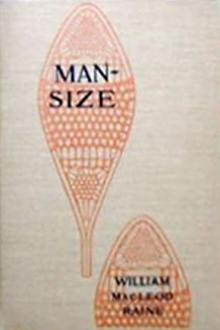Laughing Bill Hyde and Other Stories by Rex Beach (ebook smartphone .TXT) 📗

- Author: Rex Beach
Book online «Laughing Bill Hyde and Other Stories by Rex Beach (ebook smartphone .TXT) 📗». Author Rex Beach
"Well, Kid," he announced, "me 'n' the Doc have sold Eclipse Creek, and we bow out tomorrow on the big smoke."
Ponatah opened her lips, but no sound issued. She possessed a strong young body, but the strength, the life, seemed suddenly to go out of it, leaving her old and spiritless.
"Got a kind word for us?" the man inquired, with a twinkle.
"I'm glad you struck it rich," she murmured, dully. "You—you'll take care of yourself, Billy?"
"Who, me? I don't s'pose so. I don't know how to take care of nothing." There was a moment of silence. "Like me?" he asked.
Ponatah turned away blindly, but as she did so Laughing Bill put his hand gently upon her shoulder, saying:
"Cheer up, Kid. You're going to join the troupe. I've come to get you."
There was amazement, incredulity, in the girl's face as she lifted it to his. "What do you—mean?" she quavered. "Are you going to—marry me?"
"You guessed it!" he laughed. "I been aiming to put up that job on you for a long time, but I had a lot of deals on my hands. I was a sort of power-of-attorney for a coupla simps, and it kept me busy. If you think the two of us can do with three lungs, why, we'll grab a psalm-shouter and—"
"Billy! Billy!" Ponatah clung to him fiercely, hungrily. "Oh,
Billy—I'll make you well. We'll go to Arizona, Colorado,
Montana—where it is high and dry—"
"I been to them places," he told her, dubiously, "and I 'most stopped breathing altogether."
"New Mexico, then. You won't be ashamed of me there."
"Say, Kid! I wouldn't be ashamed of a harelip and warts in New Mexico. But you got me wrong; I'm plumb proud of you, and just to prove it I aim to make you carry our bank-roll in your name. That's how she stands at the bank, and that's how she's goin' to stand. From time to time you can gimme a check for what you think I'm wuth. Now then, do with me as you will; grab your lid; we'll join hands and be soldered up."
Laughing Bill stared after the girl as she hurried away; musingly he said: "The little Doc got in on no pair, for it was all her coin, of course. But she'd 'a' had to split, fifty-fifty, with a lawyer, so it ain't a bad deal all around."
THE NORTH WIND'S MALICEIt had snowed during the night, but toward morning it had grown cold; now the sled-runners complained and the load dragged heavily. Folsom, who had been heaving at the handle-bars all the way up the Dexter Creek hill, halted his dogs at the crest and dropped upon the sled, only too glad of a breathing spell. His forehead was wet with sweat; when it began to freeze in his eyebrows he removed his mittens and wiped away the drops, then watched them congeal upon his fingers. Yes, it was all of thirty below, and a bad morning to hit the trail, but—Folsom's face set itself—better thirty below in the open than the frigid atmosphere of an unhappy home.
Harkness, who had led the way up the hill, plodded onward for a time before discovering that his companion had paused; then, through the ring of hoar frost around his parka hood, he called back:
"I'll hike down to the road-house and warm up."
Folsom made no answer, he did not even turn his head. Taciturnity was becoming a habit with him, and already he was beginning to dislike his new partner. For that matter he disliked everybody this morning.
Below him lay the level tundra, merging indistinguishably with the white anchor-ice of Behring Sea; beyond that a long black streak of open water, underscoring the sky as if to emphasize the significance of that empty horizon, a horizon which for many months would remain unsmudged by smoke. To Folsom it seemed that the distant stretch of dark water was like a prison wall, barring the outside world from him and the other fools who had elected to stay "inside."
Fools? Yes; they were all fools!
Folsom was a "sour-dough." He had seen the pranks that Alaskan winters play with men and women, he had watched the alteration in minds and morals made by the Arctic isolation, and he had considered himself proof against the malice that rides the north wind—the mischief that comes with the winter nights. He had dared to put faith in his perfect happiness, thinking himself different from other men and Lois superior to other wives, wherefore he now called himself a fool!
Sprawled beside the shore, five miles away, was Nome, its ugliness of corrugated iron, rough boards, and tar paper somewhat softened by the distance. From the jumble of roofs he picked out one and centered his attention upon it. It was his roof—or had been. He wondered, with a sudden flare of wrathful indignation, if Lois would remember that fact during his absence. But he banished this evil thought. Lois had pride, there was nothing common about her; he could not believe that she would affront the proprieties. It was to spare that very pride of hers, even more than his own, that he had undertaken this adventure to the Kobuk; and now, as he looked back upon Nome, he told himself that he was acting handsomely in totally eliminating himself, thus allowing her time and freedom in which to learn her heart. He hoped that before his return she would have chosen between him and the other man.
It was too cold to remain idle long. Folsom's damp body began to chill, so he spoke to his team and once more heaved upon the handle-bars.
Leaving the crest of the ridge behind, the dogs began to run; they soon brought up in a tangle at the road-house door. When Harkness did not appear in answer to his name Folsom entered, to find his trail-mate at the bar, glass in hand.
"Put that down!" Folsom ordered, sharply.
Harkness did precisely that, then he turned, wiping his lips with the back of his hand. He was a small, fox-faced man; with a grin he invited the new-comer to "have one."
"Don't you know better than to drink on a day like this?" the latter demanded.
"Don't worry about me. I was raised on 'hootch,'" said Harkness.
"It's bad medicine."
"Bah! I'll travel further drunk than—" Harkness measured his critic with an insolent eye—"than some folks sober." He commenced to warm himself at the stove, whereupon the other cried, impatiently:
"Come along. We can't stop at every cabin."
But Harkness was in no hurry, he consumed considerable time. When he finally followed Folsom out into the air the latter, being in a peculiarly irritable mood, warned him in a voice which shook with anger:
"We're going to start with an understanding. If you take another drink during the daytime I'll leave you flat."
"Rats! How you aim to get to the Kobuk without me?" asked Harkness.
"I'll manage somehow."
The smaller man shot a startled glance at the speaker, then his insolence vanished. "All right, old top," he said, easily. "But don't cut off your nose to spite your face. Remember, I promised if you'd stick to me you'd wear gold-beaded moccasins." He set off at a trot, with the dogs following.
This fellow Harkness had come with the first snow into Nome, bearing news of a strike on the Kobuk, and despite his braggadocio he had made rather a good impression. That luck which favors fools and fakers had guided him straight to Folsom. He had appeared at a psychological moment in the latter's affairs, two disastrous seasons having almost broken Folsom and rendered him eager to grasp at anything which promised quick returns; moreover, the latter had just had a serious quarrel with his wife. Harkness had offered a half interest in his Kobuk claims for a grubstake and a working partner, and, smarting under the unaccustomed sting of domestic infelicity, the other had accepted, feeling sure in his own mind that Lois would not let him leave her when the time came to go. But the time had come, and Lois had offered no objection. She had acted strangely, to be sure, but she had made no effort to dissuade him. It seemed as if the proposal to separate for the winter had offended rather than frightened her. Well, that was the way with women; there was no pleasing them; when you tried to do the decent thing by them they pretended to misunderstand your motives. If you paid them the compliment of utter confidence they abused it on the pretext that you didn't love them; if you allowed your jealousy to show, they were offended at your lack of trust.
So ran the husband's thoughts. He hoped that six months of widowhood would teach Lois her own mind, but it hurt to hit the trail with nothing more stimulating than a listless kiss and a chill request to write when convenient. Now that he was on his way he began to think of the pranks played by malicious nature during the long, dark nights, and to wonder if he had acted wisely in teaming up with this footless adventurer. He remembered the malice that rides the winter winds, the mischief that comes to Arctic widows, and he grew apprehensive.
The travelers put up that night at the Tin Road-house, a comfortless shack sheathed with flattened kerosene cans, and Folsom's irritation at his new partner increased, for Harkness was loud, boastful, and blatantly egotistical, with the egotism that accompanies dense ignorance.
The weather held cold, the snow remained as dry as sand, so they made slow progress, and the husband had ample time to meditate upon his wrongs, but the more he considered them the less acutely they smarted him and the gentler became his thoughts of Lois. The solitudes were healing his hurt, the open air was cooling his anger.
At Kougarok City, a miserable huddle of cottonwood cabins, Harkness escaped his partner's watchful eye and got drunk. Folsom found the fellow clinging to the bar and entertaining a crowd of loafers with his absurd boastings. In a white fury he seized the wretch, dragged him from the room, and flung him into his bunk, then stood guard over him most of the night.
It was during the quieter hours when the place rumbled to snores that Folsom yielded to his desire to write his wife, a desire which had been growing steadily. He was disgusted with Harkness, disappointed with the whole Kobuk enterprise, and in a peculiarly softened mood, therefore, he wrote with no attempt to conceal his yearning, homesick tenderness.
But when he read the letter in the morning it struck him as weak and sentimental, just the sort of letter he would regret having written if it should transpire that Lois did not altogether share his feelings. So he tore it up.
Those were the days of faint trails and poor accommodations; as yet the road to the Arctic was little traveled and imperfectly known, so Harkness acted as guide. He had bragged that he knew every inch of the country, but he soon proved that his ideas of distance were vague and faulty—a serious shortcoming in a land with no food, no shelter, and no firewood except green willows in the gulch-bottoms. Folsom began to fear that the fellow's sense of direction was equally bad, and taxed him with it, but Harkness scoffed at the idea.
Leaving the last road-house behind them, they came into a hilly section of great white domes, high hog-backs, and ramifying creeks, each one exactly like its neighbor; two days' travel through this, according to Harkness, should have brought them to the Imnachuck, where there was food and shelter again. But when they pitched camp for the second night Folsom felt compelled to remind his partner that they were behind their schedule, and that this was the last of their grub.
"Are you sure you're going right?" he inquired.
"Sure? Of course I'm sure. D'you think I'm lost?"
Folsom fed some twisted willow-tops into the sheet-iron stove. "I wouldn't recommend you as a pathfinder," said he. "You said we'd sleep out one night. This is two, and to-morrow we'll walk hungry."
"Well, don't blame me!" challenged the other. "I'm going slow on your account."
Now nothing could have galled Folsom more than a reflection upon his ability to travel. His lips whitened, he was upon the point of speaking his mind, but managed to check himself in time. Harkness's personality rasped him to the raw,





Comments (0)